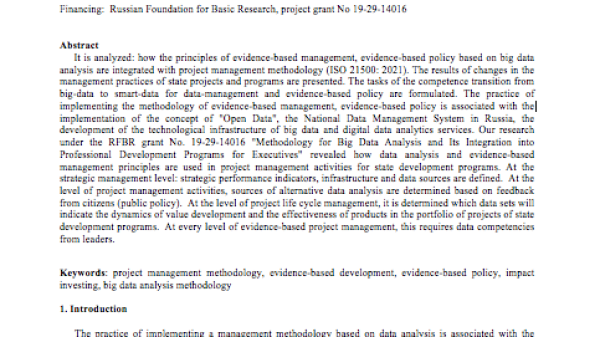
Fiofanova O.A. Project management methodology in the practice of evidence-based development, evidence-based policy/ IPMA World Congress «Project Management in the Digital Transformation Era. 2021. (Scopus/ Web of Science)
Abstract
It is analyzed: how the principles of evidence-based management, evidence-based policy based on big data analysis are integrated with project management methodology (ISO 21500: 2021). The results of changes in the management practices of state projects and programs are presented. The tasks of the competence transition from big-data to smart-data for data-management and evidence-based policy are formulated. The practice of implementing the methodology of evidence-based management, evidence-based policy is associated with the implementation of the concept of "Open Data", the National Data Management System in Russia, the development of the technological infrastructure of big data and digital data analytics services. Our research under the RFBR grant No. 19-29-14016 "Methodology for Big Data Analysis and Its Integration into Professional Development Programs for Executives" revealed how data analysis and evidence-based management principles are used in project management activities for state development programs. At the strategic management level: strategic performance indicators, infrastructure and data sources are defined. At the level of project management activities, sources of alternative data analysis are determined based on feedback from citizens (public policy). At the level of project life cycle management, it is determined which data sets will indicate the dynamics of value development and the effectiveness of products in the portfolio of projects of state development programs. At every level of evidence-based project management, this requires data competencies from leaders.
Keywords: project management methodology, evidence-based development, evidence-based policy, impact investing, big data analysis methodology
1. Introduction
The practice of implementing a management methodology based on data analysis is associated with the implementation of the Open Data Concept, the National Data Management System in Russia, the development of the technological infrastructure of big data and digital data analytics services.
The practice of implementing project management is associated with the need to ensure development through differentiation in state programs of project and process components (Decree of the Government of the Russian Federation "On the transfer of the state program" Development of education "to project management") [1].
The new Regulation on the management system of state programs of the Russian Federation [2], which establishes the rules for the development, implementation, monitoring and evaluation of the effectiveness of state programs of the Russian Federation (comes into force in 2022), updates new monitoring models congruent with the set of planned results, as well as actualizes demand on the methodology of data analysis (methodology for calculating indicators) and digital data analytics services based on artificial intelligence technologies. The regulation provides for “the allocation in the structure of state programs - PROJECTS, determined, formed and implemented in accordance with the Decree of the Government of the Russian Federation of October 31, 2018. No. 1288 "On the organization of project activities in the Government of the Russian Federation" (Regulation on project activities).
Thus, the State Program is a tool for strategic development management, a tool for budgeting development directions, a tool for consolidating communities participating in development projects.
The analysis of data as conditions and results of development is organized in the state automated information system "Management", which collects and processes data, analyzes the implementation and evaluates the effectiveness of the implementation of state programs and their structural elements (PROJECTS).
In the analytical information system "Portal of state programs" (www.programs.gov.ru) [3], publicly available information is posted on the results of data analytics and on the assessment of the effectiveness of state programs.
Probably, the new management practice actualizes the need for the development of data-competencies among educational leaders. The project competencies of managers have been evaluated and certified for a long time [4], and competitive practices [5] make it possible to identify the most effective organization of Project offices responsible for the implementation of state projects and state programs and analysis of their effectiveness. But data competencies are not included in certification and competency assessment systems. It is these competencies that change the competence structure of management activities.
In many countries of the world - top 100 according to the Networked Readiness Index, digital environment standards and data analysis standards are developed. Such standards make it possible to assess the technological maturity and maturity of the management system in the implementation of government projects and government programs.
In 2021, Rosstandart introduced the Big Data terminology standard [6] GOST “Information Technologies. Big data. Overview and vocabulary ", which is identical to the international standard" Information technology - Big data - Overview and vocabulary ". After terminology standards, technology standards are enacted. But already now in the terminological standard the sequence of actions in working with big data is fixed: “data analytics - receiving, collecting, checking and processing data, evaluating them, visualizing and interpreting”, “data variability - the format and structure of data data, semantics and quality of the data array , variability of values ”[6].
If technologically working with big data is standardized in international and national standards, and standardized technologies imply the universality of working with big data, then with regard to data analytics in the field of education - methodologically working with data is more complicated.
This complexity is primarily due to the fact that in education as a field of human development, not only the Perfomance Management Systems methodology is applied, but also the Human Capital Management Systems methodology, which characterizes the optics of humanitarian systems, digital humanities, big-data development analytics person.
https://ru.ipma2021.world/program?tab=program&day=3
















































